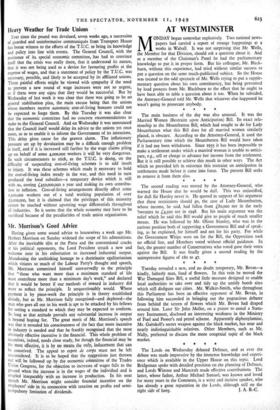AT WESTMINSTER
MONDAY began somewhat explosively. Two national news- papers had carried a report of strange happenings at a works in Walsall. It was not surprising that Mr Wells, the Member for that Division, should ask a question about it. And as a member of the Chairman's Panel he had the parliamentary knowledge to put it in proper form. But his colleague, Mr. Black- burn, without this experience, had tried without similar success to put a question on the same much-publicised subject. So the House was treated to the odd spectacle of Mr. Wells trying to put a supple- mentary question about his own constituency, but being prevented by loud protests from Mr. Blackburn to the effect that he ought to have been able to table a question about it too. When he subsided, the Attorney-General told Mr. Wells that whatever else happened he wasn't going to prosecute anybody. * * * * The main business of the day was also unusual. It was the Married Women (Restraint upon Anticipation) Bill. Its exact rela- tionship to the Mountbatten Bill, which had sought to do for Lady Mountbatten what this Bill does for all married women similarly placed, is obscure. According to the Attorney-General, it used the Parliamentary time which the Mountbatten Bill would have taken if it had not been withdrawn. Since 5935 it has been impossible to make a settlement under which a married woman is unable to antici- pate, e.g., sell or charge in advance her income from the settlement. But it is still possible to achieve this result in other ways. The Act which so provided left in existence this restraint on anticipation in settlements made before it came into force. The present Bill seeks to remove it from them also. * * * * The second reading was moved by the Attorney-General, who warned the House that he would be dull. This was unjustified, for dull Sir Hartley never is. He quoted in support of his argument that these restrictions should go, the case of Lady Mountbatten, whose income, he said, had fallen from £8o,000 net in the early 'twenties to £4,500 net in 1948. But his main argument was the relief which he said this Bill would give to people of much smaller means. He was followed by Mr. Oliver Stanley, who was in the curious position both of supporting a Government Bill and of speak- ing, as he explained, for himself and not for his party. For while the Government Whips were on for the Bill, the Opposition took no official line, and Members voted without official guidance. In fact, the greater number of Conservatives who voted gave their votes against the Bill. It was finally given a second reading by the unimpressive figures of 58o to 47. * * * * Tuesday revealed a new, and no doubt temporary, Mr. Bevan—a kindly, fatherly man, fond of flowers. In this vein he moved the War Damaged Sites Bill, a useful little measure designed to enable local authorities to take over and tidy up the untidy bomb sites which still disfigure our cities. Mr. Walker-Smith, who throughout this Parliament has been an effective opponent of Mr. Bevan, in following him succeeded in bringing out the pugnacious debater from behind the screen of flowers which Mr. Bevan had draped around him. Later Sir John Mellor, on a prayer to annul a Statu- tory Instrument, disclosed an interesting weakness in the Ministry of Fuel and Power's red petrol scheme. Apparently diphenylamine, Mr. Gaitskell's secret weapon against the black market, has near and nearly indistinguishable relatives. Other Members, such as Mr_ Nally, preferred to discuss the more congenial topic of the black market.
* * * * The Lords on Wednesday debated Defence, and as ever the debate was made impressive by the immense knowledge and experi- ence which is available in the Upper House on this topic. Lord Bridgeman spoke with detailed precision on the planning of Defence, and Lords Winster and Mancroft made effective contributions. The tt laer, whose father, Arthur Michael Samuel, was known and loved for many years in the Commons, is a witty and incisive speaker, who has already a great reputation in the Lords, although still on the


































 Previous page
Previous page